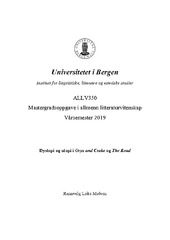Dystopi og utopi i Oryx and Crake og The Road
Master thesis
Permanent lenke
https://hdl.handle.net/1956/19930Utgivelsesdato
2019-06-08Metadata
Vis full innførselSamlinger
- Master theses [274]
Sammendrag
A Brief Summary In this master thesis I investigate how dystopic and utopic elements unfold in the two novels Oryx and Crake (2003), written by Canadian author Margaret Atwood, and The Road (2006), written by the American author Cormac McCarthy. The theoretical foundation of my thesis is Arnold van Gennep’s (1873-1957) work on the liminal phase, maybe more commonly known or referred to as the “threshold theory”. The theory describes rituals of for instance how a child transforms from being a child to an adult, and how there in between being a child and becoming an adult is a window of opportunity, where almost everything is possible, or at least not determined. The other main theory I lean my analyses and conclusions on is the Australian philosopher Val Plumwood’s work on dualism, and false dichotomies. The main effect of these false dichotomies is a hierarchical arrangement of the world, for instance; where humans are placed above nature, or men above women. The primary focus of my thesis is to investigate who the people living after a disaster of worldwide proportions are, and which elements of utopia there are in these dystopic fictional versions of the world. What is left, and what is still possible? I try to shed light on some of the various aspects of human life as it is described in these novels, for instance the relationship between parents and children, between men and women, and humans and nature. I take into consideration both similarities and differences between the two books, and how they at the same time tell a very different story, yet also converge at several crucial points. As to conclusions, there is in my view an opportunity for change in the liminal phases as they are presented in these novels. Some of these possibilities are not obvious at first glance. By reading closely, however, one discovers for instance how the little boy in The Road is a liminal character, and the boundless empathy between him and his father promises hope for a future in an otherwise almost completely bleak world.
